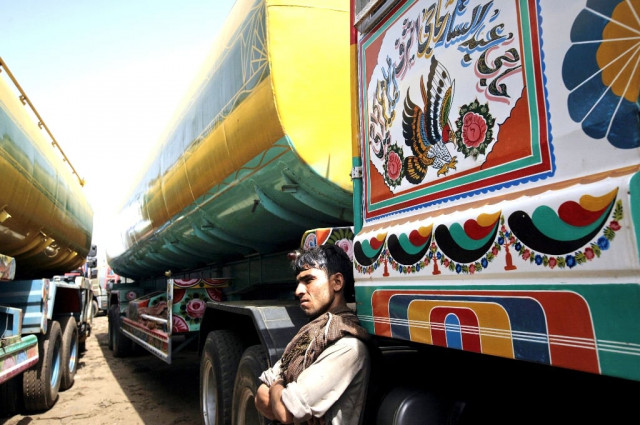Uncertainty prevails in Khyber amidst resumption of NATO supplies
Officials remain uncertain as tribesmen are caught up in an emotional motley of fear and prosperity.

Clueless tribesmen, journalists and security officials wait for a notification two days after Pakistan and the United States agreed to reopen the supply line, which has been a contentious issue between the two countries.
Rahat Gul, an official of the political administration who waits in his tent-like office chuckles and says grimly, “It’s been two days since we heard about it, but there seems to be no notification to allow oil tankers or container to pass, although the roads are clear."
Back in Peshawar, several members of religious parties shout death to the US and burn tires “infidelity to the blood of the martyrs of Salala,” says a banner of the Jamaat-e-Islami, visible through the thick black smoke.
Banned organisations do not want to be left behind. But owing to the situation, they contact the media through fax and emails, vowing to target every container that passes through the route.
The educated middle class in Peshawar is perhaps the most perplexed. Baseer Khan, a student of international relations sums up the situation in words that can hardly be recounted for.
“Who knew that the road to Washington would one day pass through the barren mountains of the Khyber Agency,” he says.
Anxious custom officials and the local Khasadar force, whose pockets have gone dry in the past months, are perhaps the happiest of all but manage to stifle it.
“No container has crossed into Afghanistan, we are not allowed to do that,” says Asfandyar, a customs official.
The perplexity, however, is revealed when one talks to the tribesmen, some of whom have invested millions in the transport industry. Sharbat Khan Shinwari, owner of a truck says they were being paid Rs700,000 for a single trip to Afghanistan, which is quite profitable.
“This amount is sufficient enough to save at least 200,000 per trip as these American contractors, who are sitting in the port city of Karachi, are willing to pay us higher than the market rates,” says Shinwari.
In the past, the companies had compensated for all losses claims.
“Perhaps the transport sector has benefited the most from the NATO supplies but we are not alone as there are thousands of mechanics, hotels and parking lots that are dependent on the transport sector,” he says.
In an area hit by militancy, narratives differ. Afzal Pur , from the Khuga Khel said that hundreds of innocent people have been killed because of the supply route passing through the residential area. “It is trans-national traffic on a local route, it wasn’t meant for heavy vehicles but for local transport,” says Pur.
He adds that if the government does not show its immediate concern “it’s just the innocent that will die once again.”













COMMENTS
Comments are moderated and generally will be posted if they are on-topic and not abusive.
For more information, please see our Comments FAQ